You likely spend a lot of time on your couch, whether you’re snuggling up for a good show, taking a much deserved midday nap, or gathering together with loved ones for game night. In fact, with the exception of your bed, your couch is probably the piece of furniture where you spend the most time.
Unfortunately, there is some seriously sketchy stuff added to our upholstered furniture. So in this article, we’re diving deep into:
- what to avoid in a couch
- what to look for in a non-toxic sofa
- our favorite non-toxic (and beautiful!) furniture brands offering safer non-toxic couches, loveseats, sectionals, sleeper sofas, armchairs, ottomans, and benches
Let’s get into it, shall we?
Table of Contents
- Stain- and Water-Resistant Sprays & Finishes
- Flame Retardants
- The Problem with Secondhand Sofas
- Synthetic Fabrics
- Foams
- Engineered Wood
- Zero Flame Retardants
- Zero Stain and Water Repellants (PFAS-Free)
- Solid Wood
- Natural & Organic Fabrics
- What About Leather & Fake Leather?
- No- or Low-VOC Glues, Stains, and Finishes
- Better Foams
- Other Third-Party Certifications to Look For
- These Are The Best Brands for Non-Toxic Couches, Sofas, Armchairs, & Ottomans
- “Okay” Options for a Non-Toxic Couch
- Some Related Guides You Might Like
This post contains affiliate links, which means we may earn a small commission if you choose to make a purchase.
Featured Image: Medley
If you’d like to read more about the specific toxins found in most couches along with what to look for instead, click on the toggles below for more info. If you’d rather just skip right to our recommended brands, scroll down.
The Toxic Chemicals Commonly Found in Couches & Upholstered Furniture
What makes a couch toxic? Well, there are a lot of different things to consider, from the raw materials used to the additives applied to the foams and fabrics. Let’s break it down:
Stain- and Water-Resistant Sprays & Finishes
Many couches and other types of furniture are sprayed or treated with stain-resistant treatments to help minimize the damage of spills and accidents.
While keeping stains at bay is a good idea not only for aesthetics but also for things like preventing mold growth, the chemicals used to make these finishes are known toxins.
Most of the time, these treatments are made using per- and polyfluoroalkyl substances, a.k.a. PFAS, a.k.a. “forever chemicals.”
You’ve probably heard about this family of chemicals before—they’re the same ones used in Teflon. These harmful chemicals are linked to everything from cancer to reproductive problems, birth defects to immunity issues, liver damage to increased cholesterol and blood pressure, and more.
And unlike some other toxins like phthalates, this family of chemicals are bioaccumulative, which means they don’t break down but instead remain in our bodies and ecosystems forever (hence the name “forever chemicals”).
For more about this family of chemicals, check out documentary The Devil We Know and the movie Dark Waters. (Or, if you prefer to read, check out the book they’re both based off of: Exposure by Robert Bilott.) These two films tell the story of the shameful actions of chemical giant DuPont, who knew these chemicals were toxic but covered it up and kept manufacturing them anyway. Fast forward to today and they’re still doing it.
To make matters worse, recent evidence suggests that PFAS don’t even do a good job at preventing stains on furniture. This is a story we’ve heard before when it comes to flame retardants. (More on that in a minute.)
At this point in time, manufacturers are not required to label their products to let consumers know if they contain PFAS or not, so it’s very difficult to tell whether something is safe from these chemicals. Most of the time, you’ll have to actually reach out to the manufacturer and ask.
The good news, however, is that PFAS legislation is finally starting to change, with some states beginning to ban PFAS in certain products like clothing and cosmetics. So my guess is that this landscape will change quite a bit over the next decade and that in the near future, it won’t be so difficult to find couches without PFAS.
Flame Retardants
“The average American baby is born with 10 fingers, 10 toes and the highest recorded levels of flame retardants among infants in the world. The toxic chemicals are present in nearly every home, packed into couches, chairs and many other products. Two powerful industries — Big Tobacco and chemical manufacturers — waged deceptive campaigns that led to the proliferation of these chemicals, which don’t even work as promised.”
This quote comes from a Chicago Tribune investigation called “Playing With Fire,” which outlines a successful decades-long effort by the chemical and tobacco industries to put toxic fire retardants in a multitude of everyday products despite the fact that they don’t even slow down fires! (There is also a documentary based on this story as well, called Toxic Hot Seat.)
There are a lot of different kinds of flame retardant chemicals, and Toxic Free Future has a great resource if you want to dive deeper into each type. These chemicals are linked to things like cancer, thyroid disease, hormone disruption, fertility problems, decreased IQ, other developmental problems, altered neurodevelopment, and more.
Flame retardants are most often added to polyurethane (PU) foam (which we’ll talk more about it in a minute) due to its increased flammability. In the past, safety regulations in the U.S. required flame retardants be used on things like sofas (despite the fact that, as referenced above, there wasn’t any indication that these flame retardants actually increased safety in the unfortunate event of a fire).
The primary way these flame retardants actually get into our bodies is through dust. The flame retardant molecules slowly break off a piece of furniture, float into the air, and eventually land on surfaces where they collect with the dust and then are eventually ingested. (This is why regularly cleaning your home and using an air purifier can help decrease the amount of toxins you and your loved ones are breathing in!)
Similar to PFAS, most of these flame retardants stick around in the environment. They can also be bioaccumulative (which means they build up in an organism’s tissues), and they can biomagnify (which means they move up the food chain).
Flame retardants are basically everywhere these days—they’ve even been found in the tissues of polar bears, killer whales, and sea otters around the world.
There is some good news on this front, though. In 2014, the U.S. Consumer Product Safety Commission updated its regulations and flame retardants are now no longer required by law. The following year, California instituted a law requiring that any couches with flame retardants sold in the state have a label that tells the consumer they contain these toxins.
(The next time you buy a piece of furniture, look for a TB 117-2013 label, which will tell you whether or not it contains flame retardants.)
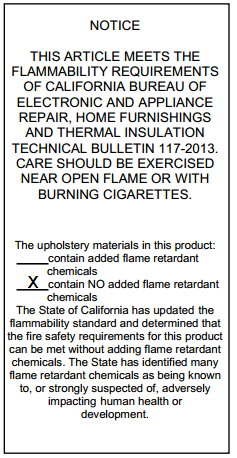
In 2018, California went even further and actually banned flame retardants in certain products at levels above 1,000 parts per million. (The law passed in 2018 but actually went into effect in 2020.) This regulation applies to children’s products, mattresses, and upholstered furniture. Other states have also passed similar legislation in recent years, but California is the only one to ban ALL flame retardants in these products (whereas other states have only banned specific ones).
Because of the fact that California is such a large economy, these steps have certainly had a positive effect on the industry as a whole. Companies like Ashley Furniture (which as of a few years ago was the largest furniture manufacturer and retailer in U.S.), Crate & Barrel, and Williams Sonoma (who owns Pottery Barn and West Elm) have stated they’ve either completely banned and/or nearly eliminated flame retardants in their furniture.
While regulation changes and an increase in label transparency is certainly very good news, it doesn’t necessarily mean we’re in the clear (yet?). A lot of sofas and other types of upholstered furniture is still made using flame retardants.
Some furniture companies may not even be aware that their products contain flame retardants if they’re sourcing polyurethane foam from manufacturers that add it to the materials earlier in the supply chain.
So although we’re making a lot of good progress in this area, it’s still important to shop carefully and ask brands if their furniture is flame retardant free.
The Problem with Secondhand Sofas
This brings us to the potential issue of buying secondhand couches. On one hand, buying secondhand is usually the more sustainable choice. It keeps furniture out of landfills and helps decrease the amount of resources needed to manufacture and ship a brand new piece of furniture. It’s also more affordable.
However, there are a couple of issues with secondhand sofas to consider. First, couches made before 2014 definitely contain flame retardants since it was required by law. These couches also will not have a label informing you about the presence of those flame retardants.
Secondly, furniture containing polyurethane foam can actually get more toxic as it gets older. As the foam ages, it slowly starts to dry out and break down. As this happens, more of the flame retardants that were originally added to the foam are released into the air.
The exception to this is vintage furniture that was made prior to the mid-1970s, which is when flame retardants first started being added. (Of course, if it’s been re-upholstered or re-cushioned since then, it might not be safe.)
If you do want to purchase an older (post-1970s) couch, you may want to consider replacing the foam and re-upholstering it with new foam and fabric that is free from flame retardants. Check out Two Sisters Textiles—they offer great natural, PFAS-free upholstery options, many of which are built for high durability.
The reality is that sometimes there is no perfect choice. Ultimately, you have to weigh everything out and make the best decision you can (even if it is not the most ideal). That’s okay! Just do the best you can.
Synthetic Fabrics
Another thing to consider when shopping for a couch is the fabric with which it’s upholstered. Most ‘conventional’ couches are made out of synthetic fabrics like polyester or faux leather.
Most of these fabrics come with various concerns. Most synthetic fabrics are just plastic, which are petroleum derivatives. Big picture, these materials aren’t great for human nor environmental health. They don’t biodegrade and they can potentially contain toxins such as heavy metals.
That being said, there are some synthetic fabrics that are safer than others. Olefin, for example, is a type of fabric that is made from ones of the ‘least-bad’ types of plastic. You’ll see that we have chosen to include some brands that use some of these safer synthetics below.
Keep in mind that even a “natural” fabric like organic cotton can still be treated with toxic additives. I would argue that it’s safer to go with a synthetic fabric that’s free from PFAS and flame retardants than to go with a cotton fabric that contains these harmful chemicals.
Foams
We recently talked about the foam problem with regard to office chairs, and it’s commonly found in couches and sofas, too. Like synthetic fabrics, polyurethane foam (PU) is derived from petroleum and often contains volatile organic compounds (VOCs) like benzene, toluene, and formaldehyde.
Many of these VOCs are known carcinogens and when you have them in your home, they slowly leak out into your air over time, contributing to indoor air pollution (this is commonly referred to as “off-gassing”).
PU foam also contains things called isocyanates (like toluene diisocyanate a.k.a. TDI and methylene diphenyl diisocyanate a.k.a. MDI), which are powerful irritants and sensitizers.
Some types of PU are more stable and less toxic than others… The problem is that it’s almost impossible to know just how safe (or unsafe) the PU foam in your couch is.
We’ll talk about what to look for in safer foams in a minute.
Engineered Wood
Considering that wood is used in almost every kind of furniture, we’ve talked about it a lot (with regard to bed frames, desks, dressers, and more).
Although you might not really think about wood when it comes to your couch (since you often can’t see most of it), it’s still an important factor to keep in mind. Along with the legs, much of the internal frame of your couch is made using wood.
You want to look for couches and sofas that are made from solid wood, as opposed to engineered wood (which includes MDF, plywood, and particleboard).
This is because engineered wood is actually just made out of pieces of wood (think sawdust and wood chips), which are glued together to look like real wood. That requires quite a lot of glue, which usually contains volatile organic compounds (VOCs) such as formaldehyde, a carcinogen. These VOCs can off-gas into your home over time, contributing to indoor air pollution.
That being said, there are ways to make engineered wood in safer ways these days. So if you do go with a brand that uses engineered wood, look for CARB II and/or US TSCA Title VI compliance. These regulations ensure that formaldehyde levels are minimal.
RELATED: What is Fast Furniture?
What’s the Healthiest Couch to Buy?
Alright, now let’s talk about what to look for in a safer, healthier, non-toxic couch.
Zero Flame Retardants
Luckily it’s gotten much easier to find couches without flame retardants in recent years. Considering that flame retardants don’t actually work when it comes to fire safety, there is absolutely no reason to spray these toxins all over the furniture we spend so much time on.
So, go for a sofa that is completely free of flame retardants.
Zero Stain and Water Repellants (PFAS-Free)
Be wary of products that have labels like “water-resistant,” “stain-resistant,” or “spill-safe.” It usually means they’ve been sprayed with toxic “forever chemicals.”
That said, some fabrics (both natural and synthetic) are more water- and stain-resistant than others, even WITHOUT these added chemicals (which can make these labels confusing at times!). If you’re ever unsure, don’t be afraid to reach out to the company and ask if they add any PFAS or other finishes to their fabrics.
Additionally, scientists have found ways to make couches more stain-resistant using vegetable-based treatments that are free from PFAS. Burrow, for example, uses a PFAS-free treatment called C0.
Solid Wood
As mentioned above, engineered wood like plywood and MDF are filled with glues, which contain lots of formaldehyde and other VOCs. So look for brands that use solid wood for their frames and legs.
Natural & Organic Fabrics
Natural and organic fabrics like cotton, linen, hemp, and wool are great options for your upholstered furniture because they’re better for human and environmental health.
One thing to consider when it comes to cotton, however, is that it can be more likely to develop mold compared to other fabric options. If you have kids, tend to make a lot of spills on the sofa, and/or are sensitive to mold, you may want to consider a safer synthetic fabric, such as Olefin.
Also keep in mind that even healthy fabrics like organic cotton can still have added flame retardant chemicals and PFAS.
What About Leather & Fake Leather?
As with almost everything else, leather has its pros, cons, and nuances. For people with kids and pets, leather can be an appealing option because it’s easy to keep clean. Leather can also be more durable and last longer than couches made from other types of fabrics.
But if you’re going to go with a leather sofa, you’ll want to choose vegetable-tanned leather. Most of the time, leather is chrome-tanned, which involves lots of toxic chemicals, including heavy metals (like lead), formaldehyde, cyanide-based dyes, and more.
Vegetable-tanned leather, on the other hand, doesn’t use all of these toxic chemicals. So if you’re going to buy leather products, you should choose veggie-tanned leather whenever possible.
The downside is that vegetable-tanned leather tends to be a longer and more expensive process. Because of that, it’s uncommon for larger things like sofas to be made from it. If you really want a leather couch, don’t be afraid to reach out and ask the company for more information about the leather they use and how it is sourced and processed. So far, EcoBalanza is the only brand I’ve found that actually offers non-toxic and vegetable-tanned leather couches.
If you’re a vegan or are trying to decrease the amount of animal products in your life, you might go for vegan leather. And while that might seem like a good idea at first, it’s important to keep in mind that faux leather is almost always plastic. It’s made from things like PU and PVC (which is the most toxic kind of plastic).
Not only that, but in 2012, the Center for Environmental Health started testing fake leather products for lead, and the results have not been pretty.
Of course, there are now plant-based vegan leathers on the market that utilize things like pineapple, apple, and mushrooms—but no one is making a couch out of those yet!
No- or Low-VOC Glues, Stains, and Finishes
The stains and finishes that are typically used on wooden furniture are heavy on the VOCs. So look for brands that are made with natural finishes like linseed oil, walnut oil, or low/no VOC synthetic finishes and glues.
Alternatively, you could look for a couch with legs that are unfinished. Then you can either leave them as-is or finish them yourself with a natural and non-toxic finish of your choice.
Better Foams
If you can, it’s best to avoid synthetic PU foam completely and opt for natural foams made from organic latex or kapok instead.
Several of the brands below use these natural materials for their cushions.
But if you do end up going with synthetic foam cushions, look for certifications like CertiPUR.
Although it’s definitely not perfect, CertiPUR-US® foams are free of:
- PBDEs, TDCPP, or TCEP flame retardants
- Formaldehyde
- Ozone depleters
- PBDEs, TDCPP, or TCEP flame retardants
- Mercury, lead, and other heavy metals
- They’re not necessarily completely free of phthalates, but they do have certain phthalate restrictions
Another better foam to look for is soy foam. These foams are also not perfect. For one, the soy industry comes with its own environmental problems. And secondly, “soy-based” foams aren’t necessarily completely plant-based and/or biodegradable as they might still have petroleum-derived foams mixed in. Still, they’re probably better than just plain PU.
Other Third-Party Certifications to Look For
Most certifications have pros and cons, but they all provide a certain level of accountability for brands to test their products against a certain set of safety criteria. In addition to CertiPUR certified foams, here are a few other labels to look for:
- The GREENGUARD and GREENGUARD Gold certifications by UL are focused on volatile organic compounds (VOCs). These labels look at the product as a whole and verify that a couch has no or low levels of a list of VOCs.
- OEKO-TEX certifies that an end product is free from a long list of toxic chemicals. This certification is most commonly applied to fabrics.
- Global Organic Latex Standard (GOLS) means that at least 95% of the latex used in a product is organically grown and sourced. This standard also looks at the impact on human health, safety, and welfare along with the environmental impact of the manufacturing process.
- Global Organic Textiles Standard (GOTS) is very similar to the GOLS certification, except that it applies to organic cotton.
- Wood that is Forest Stewardship Council (FSC) certified means it has been responsibly sourced from sustainably-managed forests.
These Are The Best Brands for Non-Toxic Couches, Sofas, Armchairs, & Ottomans
I know the above info about all of the potential toxins in your couch can be overwhelming, BUT the good news is that there are some really great brands offering non-toxic sofas, loveseats, sectionals, armchairs, and ottomans to help you create a safer living space. Here are our favorites:
1. Medley
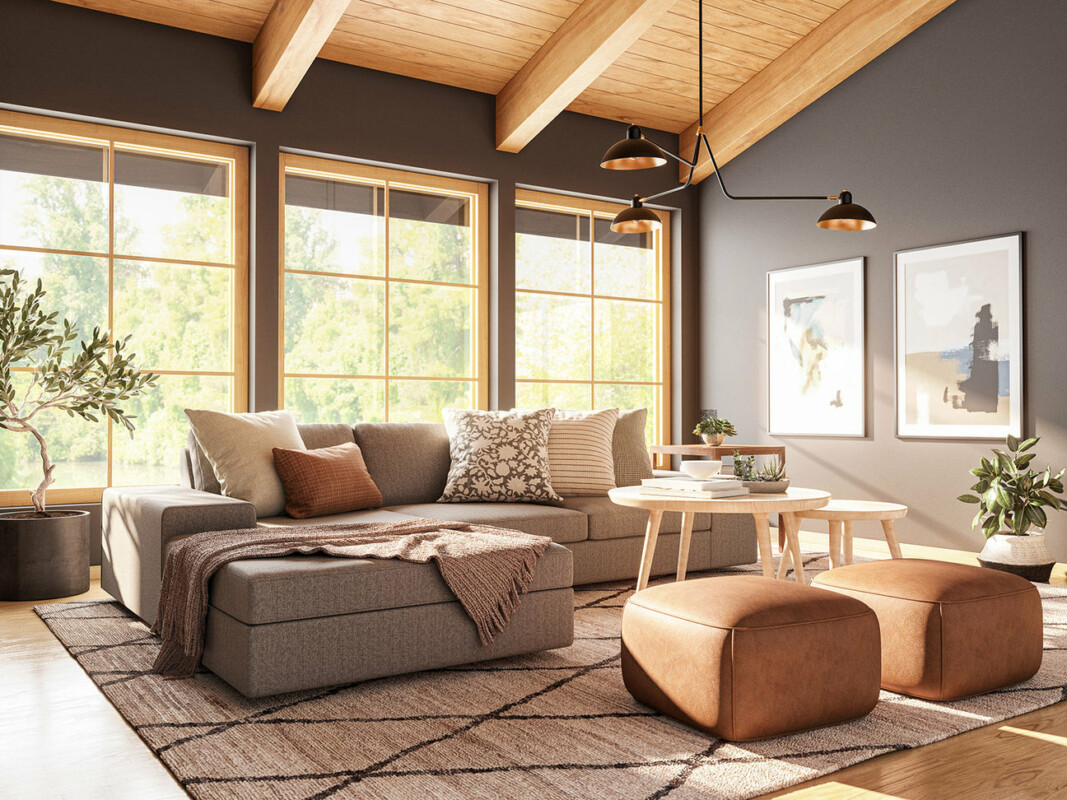
Medley is one of the best non-toxic sofa brands for beautiful and eco-friendly couches, sectionals, sleeper sofas, ottomans, and upholstered accent chairs.
In terms of materials, they use FSC-certified solid wood for their frames, zero-VOC glues, and many natural and organic fabric choices. For their foam cushions, they offer two safer options: CertiPUR-US®-certified foam and certified organic natural Dunlop latex. And of course, it’s all flame retardant free as well.
If you’re not sure which fabric you want (they have a lot of options!), you can order free swatches before you buy your couch. They offer both natural and synthetic fabric options.
Medley’s materials come with a variety of different third-party certifications, including OEKO-TEX® 100, CertiPUR-US®, Global Organic Latex Standard, Global Organic Textiles Standard, GREENGUARD Gold, and Forest Stewardship Council. Plus, all of their furniture is California Prop 65 compliant.
All of Medley’s non-toxic sofas, sectionals, sleeper sofas, and ottomans are handcrafted in the USA, in Los Angeles, California.
They also offer financing through Affirm, starting at 0% interest, and a 15-day trial & return policy.
Use the code THEFILTERY5 for 5% off your order.
2. Savvy Rest
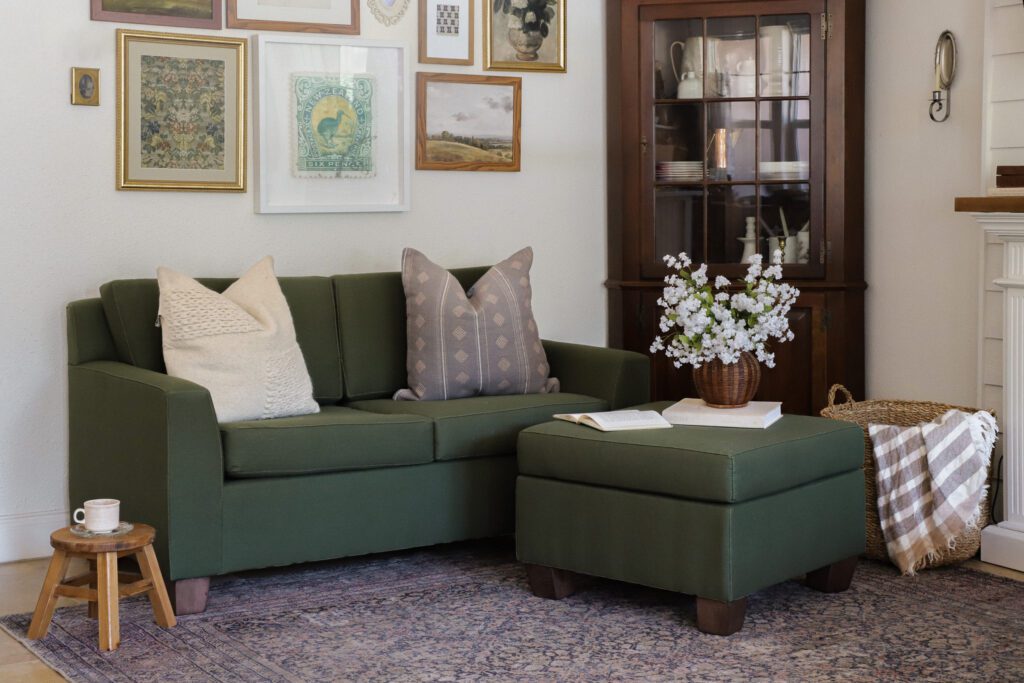
Savvy Rest’s non-toxic sofas, loveseats, armchairs, and ottomans are made from organic fabrics like cotton, hemp, and wool; natural latex foam; solid wood; and more. They come with various third-party certifications for sustainability and safety, including GOTS organic, Cradle-to-Cradle, GREENGUARD, and more.
Plus, it’s all completely free from all PFAS, flame retardants, formaldehyde glue, cardboard, metal coils, particleboard, plywood, and veneer.
Savvy Rest organic sofas and other natural furniture is made to order, which not only minimizes waste in the production process, but also allows you to get exactly what you want! You choose things like the seat firmness, the color and type of fabric, the height of the armrests, finish type, and more.
Everything is made by expert craftspeople and skilled woodworkers in their own workshop in Virginia, USA. Savvy Rest is also an employee-owned and B Corp certified company!
Use code THEFILTERY20 for 20% off.
3. Ecobalanza

One of the best brands for a non-toxic couch, Ecobalanza uses materials like GOLS certified Dunlop latex for the cushions, GOTS certified organic cotton and wool batting, natural kapok, FSC-certified solid Adler and Western Maple wood, and zero-VOC stains.
Their furniture comes with a handful of other third-party certifications as well, including OEKO-TEX, European Centre for Allergy Research Foundation (ECARF), GREENGUARD, and more.
Their Essentials Collection offers a couple of basic sofas at a more affordable price point, and their Couture Collection is more expensive but offers an endless number of options.
Their leather sofas use EcoPell leather, which is vegetable-tanned and free of heavy metals. It’s one of the only leather furniture brands I’ve been able to find that offers a vegetable-tanned leather option.
Ecobalanza’s furniture is very customizable as well. You can even design a sofa yourself if you want to. That means they can not only customize based on aesthetics and preferences, but also based on need. They can remove latex for those with an allergy, use different stains for those with extreme chemical sensitivies, or remove things like wool for vegans.
You can’t order Ecobalanza furniture straight from the website; you do have to contact them to put in your order and make sure you’re getting everything the way you want it.
Everything is handcrafted in-house by their artisan team in Seattle, Washington.
4. Natural Home by The Futon Shop
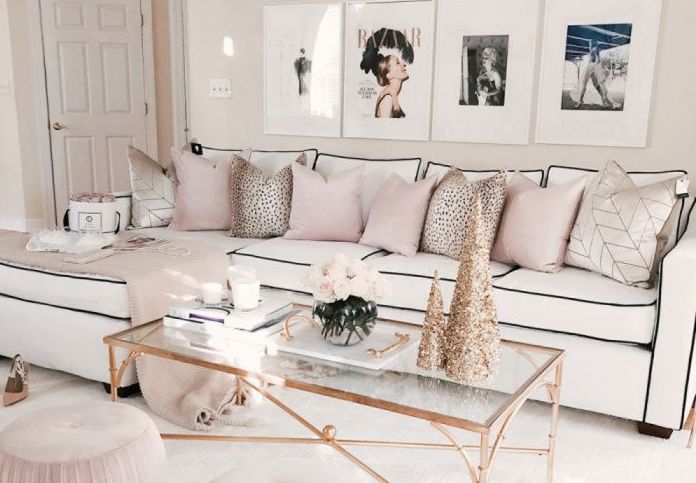
The Futon Shop’s Natural Home collection offers a few different non-toxic couches, loveseats, and sectionals that can be custom-made to order.
Instead of petrochemicals and synthetics, they use natural and organic cotton, hemp, linen, wood, latex, coconut coir, and… potato fiber! Third-party certifications include GOTS and GOLS organic, along with OEKO-TEX, which prohibits certain things like toxic dyes.
These couches contain zero petroleum-based products and no glues. If you’re extra sensitive and are looking for the most natural and organic couch possible, Natural Home by The Futon Shop is one of your best bets.
The Futon Shop offers financing through Affirm and free shipping. Their return policy is not as generous as most of the other brands listed here, so make sure you review that before making your purchase.
5. Burrow

With couches starting at $835, Burrow is one of the most affordable brands for non-toxic couches loveseats, sectionals, chairs, and ottomans.
This modular furniture is designed to be assembled, rearranged, and reconfigured so that you can not only move from home to home more easily, but you can also change the size of your sofa based on the your family size or living space.
All of Burrow’s sofas are completely PFAS-free and flame retardant free, the foams they use are CertiPUR certified, and the wood used for their frames is (mostly) FSC certified.
The fabric they use is called Olefin, which is a synthetic. But it’s made out of polypropylene, which is one of the safer plastics. Instead of PFAS, they use a vegetable-based water/stain-resistant treatment called C0.
Burrow’s couches are also pretty customizable, too. You can choose things like type of fabric, leg type, shoulder shape, and more.
Also, note that although Burrow uses solid wood in their furniture, they’re not 100% MDF-free. For most of their furniture, they use TSCA Title VI compliant MDF, which is made in Europe and contains zero formaldehyde. The only exception to this is their headboards. Although they use solid wood for the actual frame part, the headboard is made with regular MDF.
(It’s also worth noting that Burrow has been very transparent with us and our questions. So if you are ever unsure about something, don’t hesitate to reach out and ask them!)
Burrow also offers financing through Affirm, free shipping, and 30-day returns.
Although Burrow is not an organic or natural furniture brand, they do have a lot going for them in terms of chemical reduction.
6. Sabai

Sabai is another good option for more affordable non-toxic sofas and sectionals, with pricing between $1,000 and $4,000.
Their collection isn’t quite as large as some of the other brands listed here, but they do offer several different customizations, including type of fabric and leg material. They also offer slip covers, which can make it easier to keep your couch clean and/or switch up your look.
None of Sabai’s furniture contains any formaldehyde, flame retardants, or PFAS. Their cushions are made from CertiPUR-US polyurethane foam, their fabrics (which are recycled and upcycled) are untreated, and the wood used for the frames is FSC certified and finished with a low-VOC stain. And they don’t use any glue at all!
Sabai is leading the way for sustainable sofas with their closed-loop Repair and Replace program, which allows you to repair your furniture as needed to get as many years as possible out of it. They also offer a Revive program, which allows you to re-sell your sofa or buy one secondhand at 30% off.
All of Sabai’s furniture is ethically made in a family-owned factory in High Point, North Carolina. In fact, 90% of their materials are sourced within 100 miles of their production facility!
They do not offer financing at this time, but they do have a 30-day return policy and free shipping.
Like Burrow, Sabai does not use organic materials (at this time, anyway), but it’s still a brand worth considering because of the fact that they’re PFAS-free, flame-retardant free, and have so many eco-conscious initiatives in place.
7. Maiden Home

Maiden Mome carries sofas, sectionals, upholstered lounge chairs, and ottomans for you to complete your whole non-toxic living room setup. All of Maiden Home’s furniture is made without flame retardant, formaldehyd, and anti-fungal additives. Their cushions are made with CertiPUR-US certified soy-based foams.
*When shopping from Maiden Home, however, it’s important to choose your fabric carefully. Some of their fabrics do contain certain stain-resistant chemical treatments, (which are at least GREENGUARD Gold certified).
They have a lot of different fabrics to choose from, but not all of them are completely PFAS-free.
The NON-performance fabrics (such as the Mohair, Merino, and Italian Boucle collections) are completely untreated and PFAS-free.
However, the ONLY performance fabric that is PFAS-free is the Performance Woven Chenille. That one is made using a PFAS-free C0 treatment.
The other Performance Fabrics are free from PFOA and PFOS but NOT all PFAS.
So I suggest you either go with one of the untreated fabric options or the Performance Woven Chenille. Don’t be afraid to reach out to Maiden Home before you make your purchase to make sure you’re getting exactly what you want!
Maiden Home also implements other types of sustainability initiatives as well: the wood they use is responsibly sourced and meet the Sustainable Forestry Initiative standards, they use some recycled materials (like steel), and they use water-based, low-VOC glues and stains as much as possible.
They also offer financing through Affirm, starting at 0% interest, and a 30-day return policy.
Everything is made by hand by some of the top custom upholstery and wood artisans in North Carolina and Virginia.
“Okay” Options for a Non-Toxic Couch
The following brands have several different non-toxic initiatives and are definitely better than many conventional brands, but they do have some shortcomings too (mostly when it comes to their PFAS policy). IF you decide to buy a couch from one of these brands, I highly recommend reaching out to them first to make sure the fabric you get is PFAS-free.
Pottery Barn / West Elm

Pottery Barn and West Elm are actually owned by the same company, so their products are very similar.
Pottery Barn has a “Certified Nontoxic” collection, but it’s really just their own label; there’s no third-party verifying it. Much of their furniture has some good qualities like being made in America out of low-VOC materials.
West Elm has a “Sustainably Sourced” collection, which includes a lot of furniture that’s handcrafted in the USA out of FSC-certified wood. Some of their products contain organic materials, while others definitely do not. If you look for their products that use Sunbrella fabrics, some of those may be free from PFAS. (Some of Sunbrella’s fabrics are PFAS-free and others aren’t so you will likely have to reach out and ask in order to find out for sure. You can read more in our Sunbrella deep-dive.)
Although we know they don’t use flame retardants, neither of these brands are super transparent when it comes to the other potential materials and additives they do or don’t use on their upholstered furniture, and we’d like to see some more info.
Depending on where you live, you might be able to visit a Pottery Barn or West Elm store to test out their couches before you buy, which might be a selling point. At the end of the day, you just have to look into the specifics of each product and ask the brand for more information about a certain couch before you buy it.
Are IKEA Couches Non-Toxic?
IKEA’s furniture is enticing because of how affordable it is. When it comes to potentially toxic substances, there are pros and cons to this iconic Swedish brand…
One of the best things about IKEA is that intentionally-added PFAS have been banned from their products since 2016, which was before barely any other brands had started banning them. (And they also have “contamination limits” on some of the worst kinds of PFAS.)
When it comes to flame retardants, it’s a little more complicated. Since IKEA sells its furniture in countries all over the world, they have to contend with differing laws and regulations regarding both fire safety and toxic chemicals.
Their website states, “IKEA strives to totally refrain from the use of chemical flame retardants in our products and instead use techniques and materials with flame retardant properties. However, in some countries, chemical flame retardants are needed in specific products in order to pass a local legal requirement. Any products treated with chemical flame retardants meet strict emission requirements.”
So in other words, IKEA’s couches may or may not contain flame retardants. But if you’re buying a couch from IKEA in the U.S. after 2020, it most likely does not contain flame retardants.
What about the other non-toxic materials? Although IKEA does have a lot of good sustainability initiatives for the company as a whole, most of the materials they use for their sofas and sectionals include synthetic foams and fabrics, along with engineered wood and glues.
All in all, IKEA’s couches are not the worst since they don’t contain PFAS, but they can’t really be considered completely non-toxic either. It’s definitely not the worst choice though, especially considering the affordability factor. Click here to check out our deep dive into IKEA’s chemical safety initiatives!
Home
Is IKEA Furniture Non-Toxic?
Is IKEA’s furniture non-toxic? Does it contain toxic chemicals like flame retardants, PFAS, formaldehyde, or phthalates? We’re giving you all the answers!
No one wants harmful chemicals all over the furniture where they relax, binge Netflix, nap, and snuggle with loved ones.
This article showed you what kinds of toxic chemicals to avoid in upholstered furniture, what to look for in a non-toxic sofa, and some of our favorite brands that are doing things in a safer and more eco-friendly way.
If you’d like some more non-toxic living tips, news, product picks, and other fun stuff in your inbox once a week, hop on our list for Filtered Fridays!
Some Related Guides You Might Like
If you’re looking for more non-toxic furniture guides, check these out:
- Where to Find Non-Toxic Dressers for Your Bedroom & Living Room
- The Best Non-Toxic & Natural Solid Wood Dining Tables & Chairs
- Where to Find the Best Non-Toxic & Natural Wood Desks
- The Best Non-Toxic Ergonomic Office Chairs (& Cushions!)
- Best Non-Toxic High Chair Brands (+ Boosters and Hook-Ons)
- The Ultimate Guide to Non-Toxic Bedroom Furniture
- Non-Toxic Mattresses & Pillow Brands
- Your Guide to Natural & Non-Toxic Bed Frames
To get more tips, product guides, news, and more delivered to your inbox once a week, sign up for Filtered Fridays!

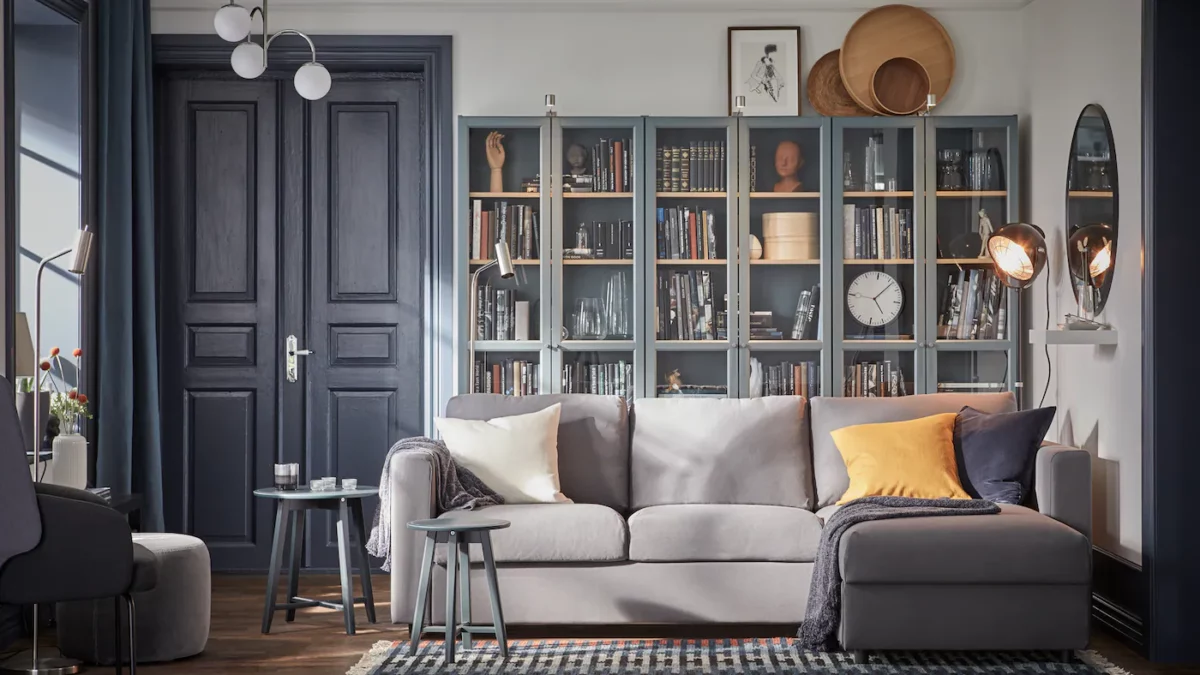

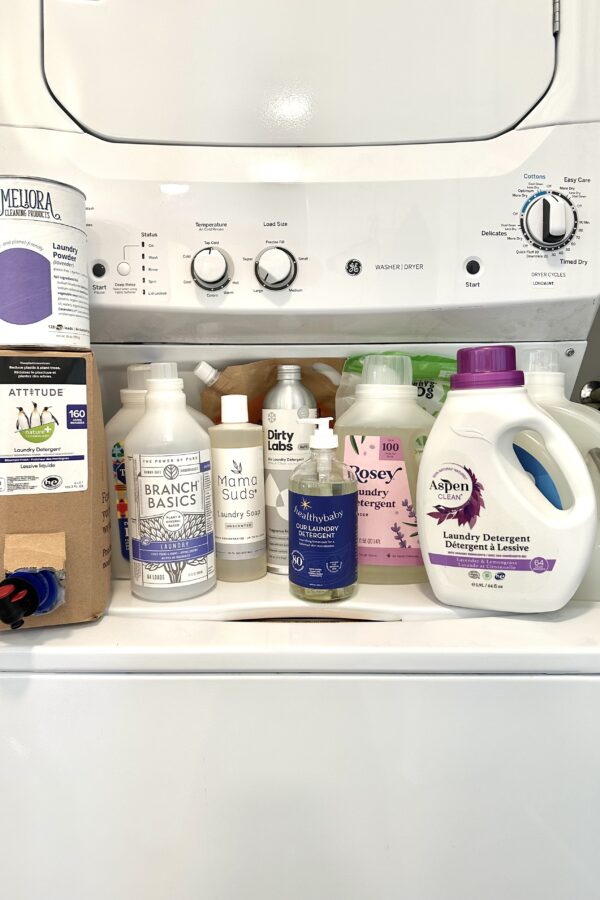
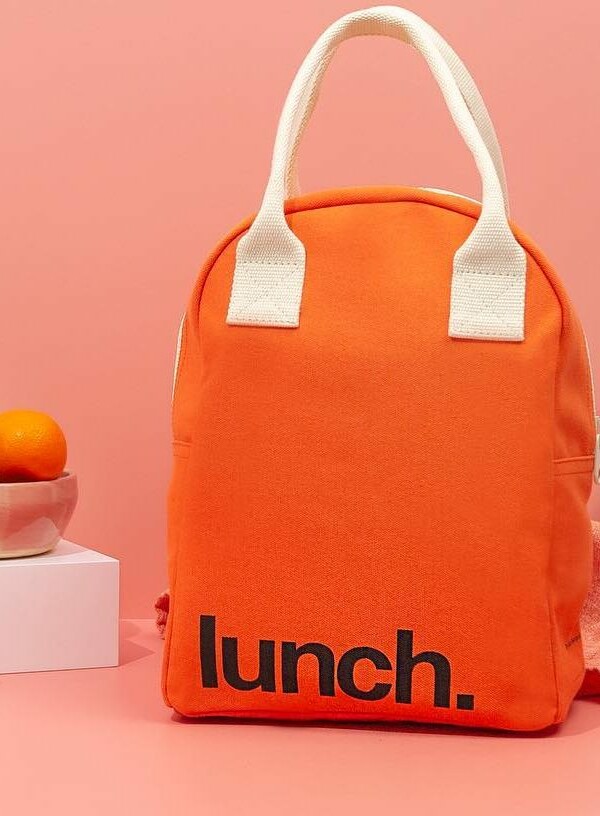
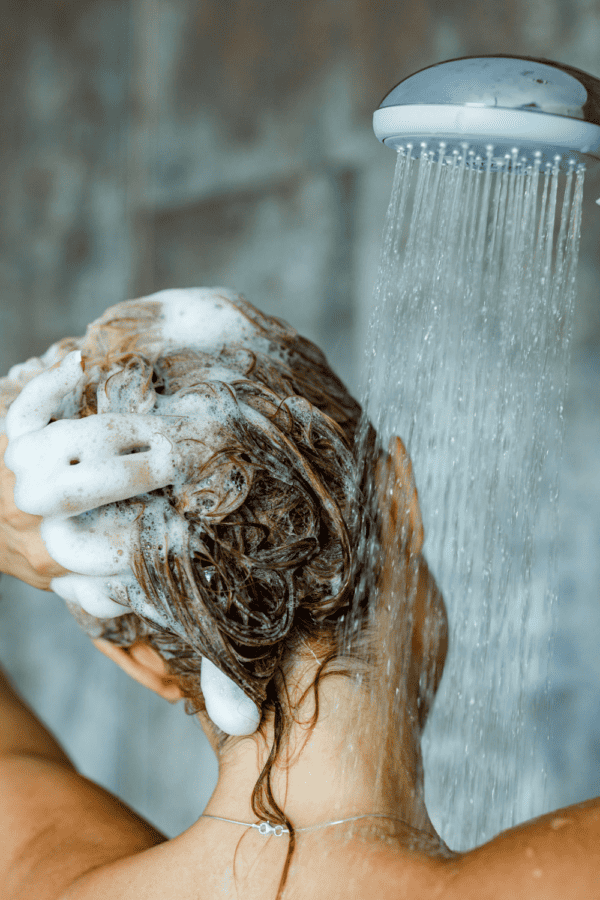
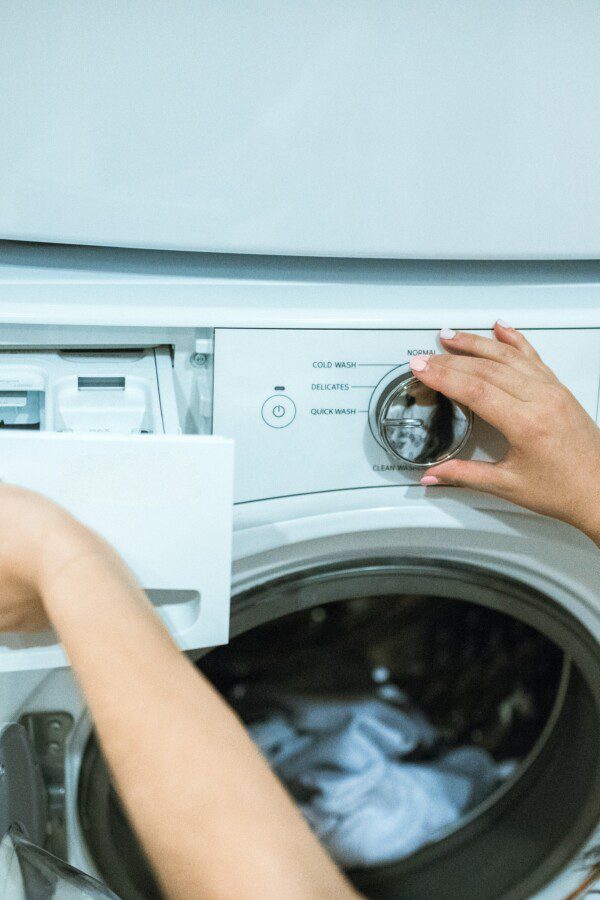
Hi Abbie,
Thank you for posting this article. I’ve spent months researching and seeking best options for furnishing a new home while trying to avoid harmful chemicals. I’ve looked time and again at all of the furniture companies/vendors suggested by the many blogs addressing toxic furniture. It’s been tremendously frustrating, maddening, disappointing, and more, but I’ve learned of some cause for hope. States are legislating end dates for the industry’s toxic emissions. A representative at one big, long established company (I think it was Smith Brothers, but am not certain) claimed that all of their furniture meets Greenguard Gold Certified standards, that they’re just waiting for the official certification, that they will then appear on the GGG site as a participating vendor, and all of their furnishing would then have the GGG logo. I was encouraged, but looking at furniture by the brand today (stuff still on the floor since end of last year, presumably), it had a typical warning blaming CA for finding certain chemicals harmful. This vendor did claim that all of their cushions are Certipur certified.
The best option we have found has been Pottery Barn, actually. A representative there told us that PB informed Sunbrella, last year, that PB would not work with them in 2024 if all of their fabrics weren’t PFAS-free. Sunbrella now indicates that none of their fabrics contain “intentionally added PFAS.” I don’t have the means at this point to evaluate that statement – maybe you do?
PB, however, has come out, as promised, with more Greenguard Gold Certified furniture, and we believe we’ll be able to go a long way toward finally accomplishing our goals via Pottery Barn. I know not everyone can afford PB, but I’m encouraged that more states are driving the need for the industry to clean up its act.
One thing I don’t see blogs offering, in recommending companies like Medley (whose efforts I appreciate very much), is any indication of how well green products from these vendors hold up. Maybe too early to know.
Once again, thank you for this piece. I hope you’ll keep following up with companies and doing your best to inform concerned furniture seekers of developments and best options.
Preface: I believe the vast majority of people will have no problem with Sabai but this is important information for the ultra sensitive folks.
We bought into the Sabai marketing around formaldehyde as did you. We couldn’t breathe around the parts containing the plywood and had to keep them in the garage until we could arrange for a return. Sabai, to their credit, when pressed, admitted the following:
“Our plywood suppliers use an ultra-low (ultra-low and acceptable) amount of formaldehyde in the production process (for making the platforms under the cushions), which is standard for that plywood. It does not off-gas and is exempt from the CARB/TSCA testing. However the supplier still tests for formaldehyde off-gassing, and is certified by CARB to show ultra-low use of formaldehyde that does not off gas.”
That sounds to me like a tangle of chemical industry jargon. The formaldehyde did off gas, and was making us feel sick.
Ending thought: the Sabai team was super supportive to work with and I would recommend them to anyone who isn’t ultra sensitive to chemicals.
Hi Jay,
Thank you so much for sharing your experience – that’s really helpful. I’m sorry to hear you had a negative reaction to Sabai’s furniture, but I’m glad to hear they were at least positive to work with in terms of customer support. I think the next time I update this article, I will try to make it more clear about which brands are more suitable for folks with chemical sensitivities.
Thank you again for sharing!
Please stop recommending Medley to people, they are AWFUL. Customer service is horrible, poor quality, expensive, and it took them two years to figure out their was lead in their cushion filling
Hi Vic,
Oh no, I’m so sorry to hear you’ve had issues with their customer service. 🙁 This is the first time I’ve personally heard of that, but I do appreciate you letting us know so that others can be aware.
In terms of the lead issue, it can take time for companies to get contaminants out of their supply chains, especially when chemicals are not added intentionally and can come from parts of the chain that they may not have as much control over. This is not unusual; there are many companies that have spent years getting a specific chemical out of their products. Personally, I’m glad that Medley spent the time and effort to do so after the issue was brought to their attention. 🙂
THANK YOU for the great read! I appreciate all the time and effort you put in to helping make furniture shopping MUCH quicker and easier for those of us who avoid toxins…..inside and OUT! I will be sharing your site with others! – Zuzu
Good morning.
Thank you for researching and sharing your blog to help so many. This is just a suggestion and not intended to criticize in anyway as your blog/site is great, just passing on what I believe to be some good info you may be interested in too. You may want to research, possibly consider taking Medley off this list if they have not resolved the issue with Lead. If you go to Lead Safe Mama she has the testing results for at least one of Medleys sofa in which they contained Lead at least to my understanding. If I am incorrect, I apologize. I just want everyone to be as healthy as possible.
Her site in which I was reading about this is:
https://tamararubin.com/?s=medley+sofa
Thank you, have a nice day.
Hi Michelle,
Thank you for this! CertiPUR foam is definitely not perfect, but it’s often the “best” option available, especially at a more affordable price point. In looking into this, it looks like Medley has resolved this issue (thanks to Tamara’s work, which is amazing!). We’ll leave Medley here for now, but will continue to keep our eye on these issues re: CertiPUR.